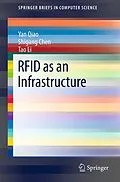RFID (radio frequency identification) tags are becoming ubiquitously available in object tracking, access control, and toll payment. The current application model treats tags simply as ID carriers and deals with each tag individually for the purpose of identifying the object that the tag is attached to. The uniqueness of RFID as an Infrastructure is to change the traditional individual view to a collective view that treats universally-deployed tags as a new infrastructure, a new wireless platform on which novel applications can be developed.
The book begins with an introduction to the problems of tag estimation and information collection from RFID systems, and explains the challenges. It discusses how to efficiently estimate the number of tags in a large RFID system, considering both energy cost and execution time. It then gives a detailed account on how to collect information from a sensor-augmented RFID network with new designs that significantly reduce execution time.
Inhalt
Introduction.- Tag Estimation in RFID Systems.- Collecting Information from Sensor-augmented RFID Systems.- Tag-ordering Polling Protocols in RFID Systems.
